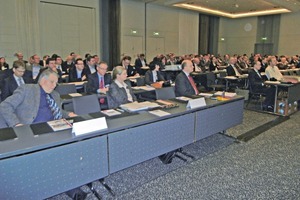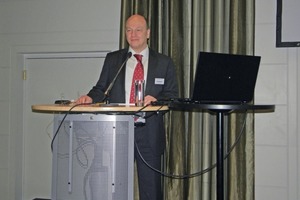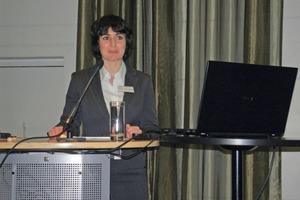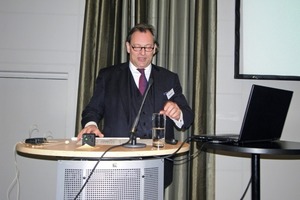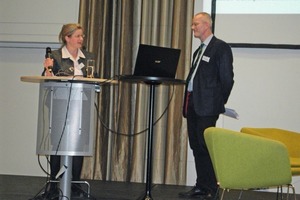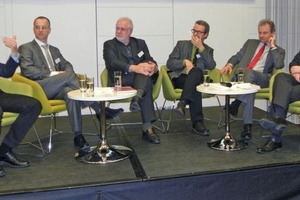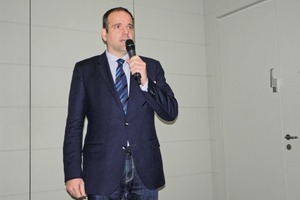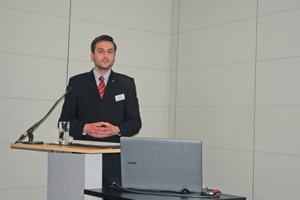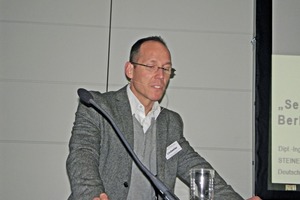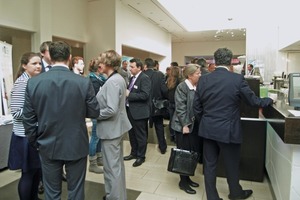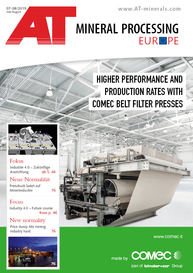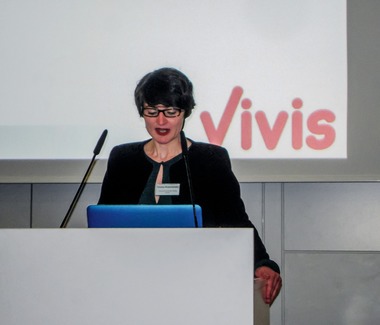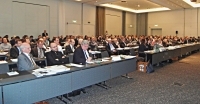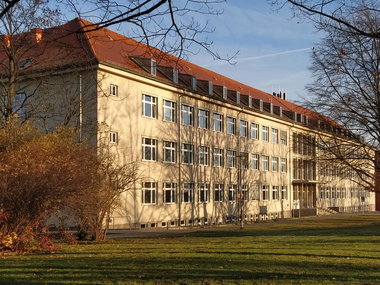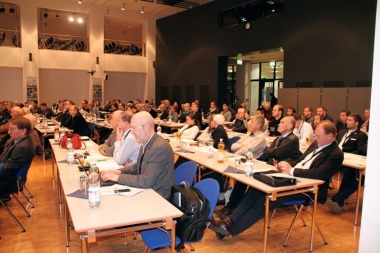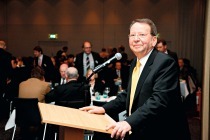Berlin Recycling and Commodity Conference 2015: Intelligent, environmentally safe use of resources
Prof. Dr.-Ing. Daniel Goldmann (Fig. 2), of the Clausthal University of Technology, and Prof. Dr.-Ing. habil. Dr. h. c. Karl J. Thomé-Kozmiensky, of the TK-Verlag publishing house of Nietwerder-Neuruppin, were responsible for the scientific management of the conference. Programme coordination was in the experienced hands of Dr.-Ing. Stephanie Thiel, of the same firm of publishers. The conference was opened by Elisabeth Thomé-Kozmiensky MSc (Fig. 4), one of the organiser’s co-workers.
In line with the concept of previous years, the first day of the conference dealt with current supra-disciplinary topics in a plenary session. Specific technical subjects were then discussed in the papers presented at the four events held in parallel on the second day of the conference.
1. Plenary session – Policy, strategy and economics
The session started with political addresses focussing precisely on European raw-materials policy. Dr. Peer Hoth, of the Federal Ministry for Economic Affairs and Energy, Berlin, examined for this purpose the European Innovation Partnership on Raw Materials (EIP). This speaker discussed the structure of the EIP (EU commissioners for environment, industry and research, the ministers of individual EU member countries, e.g. Germany, Poland, and representatives of major industrial companies) and the functions of the initiative, also citing examples of projects funded (including projects for optimisation in mining, the use of bio-technologies in mining, and the comprehensive re-use of steel-industry waste).
The central focus of the paper presented by Dipl.-Ing. Anja Degenhardt, of Forschungszentrum Jülich GmbH, Berlin, was on the promotion and funding of Research & Development by the Federal Ministry of Education and Research (BMBF), in Bonn. A whole series of projects were examined in order to illustrate the target of the funding provisions: intelligent and conservational use of resources.
A further example of European initiatives in the field of sustainable use of resources was discussed by Prof. Dr. Jens Gutzmer, of the Helmholtz Institute Freiberg for Resources Technology of the TU Bergakademie mining and technology academy Freiberg, in his paper on “KIC EIT Raw Materials“. This new “Knowledge and Innovation Community“ (KIC) is part of the European Institute of Innovation and Technology (EIT) founded in 2008 with the aim of implementing innovative solutions on the market. The EIT Raw Materials currently includes partners from industry, smaller companies, universities and research institutions from twenty-two countries, and is intended to function like a commercial enterprise. The first practical results are scheduled for 2016, in the form of the implementation of large-scale projects.
Mag. Dr. Robert Holnsteiner, of the Federal Ministry of Science, Research and Economy, Vienna, outlined Austria’s strategic route to assurance of raw-materials supplies. This is based on three central elements: 1. assurance of raw-materials supplies from domestic sources, 2. from non-EU countries and 3. via the improvement of raw-materials efficiency and recycling. The Austrian raw-materials alliance, which sees itself as a platform for stakeholders for the drafting of provisions for sustainable assurance of raw-materials supplies, was founded as an instrument for this purpose in 2012.
The “Potentials and limitations of recycling“ was the stimulating subject of the paper presented by Prof. Dr.-Ing. Martin Faulstich (Fig. 4), of the Clausthal Institute of Environmental Technology (CUTEC)/Clausthal University of Technology. This speaker ascertained in introducing his address that recycling is a core principle in achieving economic growth without negative environmental impact. As he noted, the excellent potentials for the recycling of metals, and of “mass“ metals, in particular, must be set against serious limitations. There is, on the one hand, the so-called “rebound effect“ (when improved efficiency results in greater production and greater consumption) and, on the other hand, various dissipative losses. The individual categories nonetheless exhibit potentials for improvement and for the raising of the overall efficiency of the “circular“ (closed-cycle) economy. The speaker’s observations were rounded off by reflections on the cost/revenue structure.
Prof. Dr. Armin Reller, of the University of Augsburg, reported on the ForCycle research alliance, as an example of the action being implemented by the Bavarian state government for the raw-materials turnaround. Research & Development into innovative recycling technologies and processes within this alliance is being funded to an amount of around 3 million € for a period of three years. The speaker cited a large selection of examples to show how technical solutions are to be achieved for the efficient provision of secondary feed materials in the fields of metals, composites, biogenic polymer materials and building materials.
Prof. Dr.-Ing. Daniel Goldmann expressed his thoughts on “Recycling - now and tomorrow” in an extremely fine overview paper on the current status of research and practice in recycling, outlining the challenges, strategies, structures and technologies in use. He examined collection systems, the trend in recovery rates at various levels of the value chain, and also recycling-orientated design, as well as emphasising the importance of transdisciplinary research and the existence of high-power alliances between industry and research institutions. Only in this way, he noted, would it be possible to master the new challenges now approaching (further increases in consumption of resources as the global population grows, the rebound effect, the development of new applications for specific raw materials).
The circular economy in 2015 compared to its status ten years ago was the focus taken by Dr. Christian Hagelüken, of Umicore AG & Co. KG, of Hanau-Wolfgang. Starting with a short retrospective back to the 1970s and deliberations on the term “circular economy“, this speaker took specific examples of metals, in particular, to illustrate the level the circular economy has reached today, and the factors influencing this. His conclusions: the subject of the circular economy must be approached comprehensively; innovative materials and products must be developed, high-quality recycling must be assured, recycling is impossible without collection and, finally, all-encompassing, long-term orientated campaign cooperation projects must be initiated.
In his “Contribution to recycling by a leading electronic equipment manufacturer“, Dipl.-Geol. Klaus Hieronymi, of the Hewlett-Packard Company, Bad Homburg, discussed experience gained in practice. He demonstrated most impressively that the ranking of feed materials is determined by costs, revenue and availability, and definitively influences management decisions. Only minimal quantities of metals such as Ta, Nd, Ge and GaAs are needed in the IT industry, and materials costs for these items are correspondingly low (e.g. metal costs per printer: 5.4 %, per server: 2.4 % and per laptop 1.7 %), whereas availability can, on the other hand, be a problem. Price determines whether recycling is worthwhile. Substitution is an important topic in the IT field, as are new trends in production, which are tending toward miniaturisation and the creation of “clouds” (multiple users for one server). A radically new concept from HP for tomorrow’s data-processing world is “The machine”, in which photons replace electrons, and permit storage capacities in the brontobytes (1027 bytes) range; the use of glass-fibre means that copper is now scarcely needed. The prolongation of the utilisation phase, by means, for example, of repair and re-use, is more important than recycling, in which more than 96 % of the equipment’s value is destroyed, the speaker affirmed. After evaluation of all pros and cons, the current solution has to be “general overhaul”.
“The EU’s Zero Waste Initiative” led Prof. Dr. mont. Roland Pomberger (Fig. 5), of the University of Leoben, in his address to the somewhat provocative question of “Driving force or aberration?”. The circular-economy package approved under the Barroso presidency of the EU Commission in June 2014, which includes a zero-waste programme for Europe, has now been rescinded under the Juncker presidency, leading this speaker to critical thoughts concerning the reasons for this. Prof. Pomberger cited facts and figures to demonstrate that the road to the Zero Waste Initiative, which can most certainly be seen only as a synonym for environmentally safe, resources-conserving waste management, but not for a genuine zero-waste society, would constitute a great challenge for the majority of EU member nations. The EU must, he noted, increase recycling rates from around 50 to around 70 %, and incineration rates from around 20 to around 30 %, while reducing landfill-dumping rates from around 30 to 10 %. “It remains to be hoped that the EU Commission will submit in 2015 an improved draft for the so vitally necessary future-orientated waste-management targets and regulations”, Prof. Pomberger concluded.
2 Panel discussion: “Recycling to assure raw-materials
supplies and jobs? Where is policy going?”
Dr. Hagelüken, Dipl.-Geol. K. Hieronymi, Prof. Pomberger and Dr. Sartorius discussed this interesting subject under the chairmanship of Prof. Daniel Goldmann (Fig. 6). There was, regrettably, no representative of the political world, to which these questions were, in fact, addressed, in attendance, with the result that responses to them were lacking, and only deficiencies, wishes and concepts could be expressed.
Dipl.-Geol. Hieronymi encapsulated the faults in German waste management and recycling: “We have far too much legislation which is not enforced”. Dr. Sartorius criticised European strategy under Juncker, which fails to assign the necessary importance to environmental policy. Dr. Hagelüken targeted the lack of boundary conditions appropriate for the evolution and introduction of innovative solutions, after which Prof. Gutzmer added that there is a lack of investment funding for new entrepreneurs, but that help can be provided via the KIC EIT, which bears the risk.
A major topic took the form of illegal landfills and dumping in many EU countries, such as Greece and Slovenia, which dissuade German plant-engineering companies from investing in these regions. The closure of such facilities would, however, stimulate the local economy, as a result, initially, of manual sorting jobs, for example. Long-term strategies which would provide planning certainty for plant-engineering and recycling companies were also called for (Prof. Goldmann), as was the discussion not only of assurance of resources supplies, but also, and equally, environmental protection.
3 Individual technical sessions
A balanced selection of interesting papers on specific technical topics again awaited the participants on the second day of the conference. The focal subjects are stated below, and a few selected, technically orientated addresses and their authors briefly examined by way of example.
3.1 Process-engineering
This section focussed on comminution, grading and sorting processes, important operations in recycling (Fig. 7). As Dr.-Ing. Siegmar Schäfer, of ANDRITZ MeWa GmbH, of Freiberg, showed in his noteworthy overview paper, comminution plays a key role in metals recycling, in particular. This speaker cited many practical examples to demonstrate the benefits for the recycling sector of the UC universal comminutor (twin-shaft rotor-shear), the UG universal granulator (incorporating a rotating impact shear as its functional principle) and the QZ cross-flow plane, for instance in accessing-comminution of composites, for voluminous metal swarf, oil-filters, cooling appliances, among many others.
No less interesting was the paper by Dr.-Ing. Hubert A. Schwarz, of Schauffler GmbH, of Ybbs-on-the-Danube, who discussed a joint project by the University of Leoben and Lindner Recyclingtech GmbH, of Spittal/Drau. Sixty-three materials were mentioned to examine optimisation of the specific energy input in comminution of metal composites using impact crushers and varying operating parameters (shaft speed, residence time and gap width).
Rico Ebert MSc (Fig. 8), of the TU Bergakademie Freiberg, focussed on fundamental investigations into the comminution of non-brittle lightweight materials, such as fibre-reinforced plastics, Al and AlMg alloys by applying shearing and tearing loads in a modified impact mill with variation of load geometry and speed, rotor-cutter type and gap width. Conclusions concerning the commercial comminution of this group of materials were drawn from the results of these tests.
Sensor technology continues to be an important topic in modern sorting processes, and it was to it that Dipl.-Ing. Patrick Lindweiler (Fig. 9), of Steinert Elektromagnetbau GmbH, Cologne, dedicated his remarks concerning plastics recycling. After an examination of the basic principles of this technology and the various sensor types, systems suitable for plastics recycling were examined. It is nowadays possible to combine differing sensors with one another in order to master ever more complex sorting challenges. The latest developments, such as the Unisort Black Scan application incorporating Hyper Spectral Imaging technology for poorly detectable materials, such as dark and non-spectral items, make up a new generation of such methods.
3.2 Recycling of vehicles and electrical/electronic equipment
Recycling in this field continues to enjoy great importance, in view of increasing high-tech contents in automotive and electrical-equipment engineering (electronics, lightweight materials, composites, content-material diversity, and the inclusion, in particular, of so-called critical metals), and also as a result of greater resources-strategic and environmental policy requirements in Germany and the EU. This was made apparent at the BR&RK not only by the number of papers and the interest shown in this section, but also by the diversity of the addresses.
Dismantling of life-expired cars (Prof. Dr.-Ing. Ralf Holzhauer, (Westfälische Hochschule University of Applied Sciences, Gelsenkirchen), cascade utilisation in automobiles (Dr.-Ing. Alexander Pehlken, C. von Ossietzky University, Oldenburg), enrichment of active materials from the electrode-coatings of Li-ion-containing batteries (Dipl.-Ing. Martha Gellner, TU Bergakademie Freiberg) and the raw-materials potentials of white goods, citing the example of refrigerator recycling (Gerhard Jokic, REMONDIS Electrorecycling GmbH, Lünen) are only a few examples of this. It should be noted here that the technical papers also included critical voices, reflecting a realistic image of the current potentials of recycling when economic aspects are taken into account, and warning against premature euphoria. Research in this field is nonetheless essential, in order to be able at the right time to ourselves be able to make use of such results, the implementation of which is at present only a vision. Dipl.-Ing. Hannes Fröhlich, of Electrocycling GmbH, Goslar, illustrated the great importance of separate collection/reception for recycling of complicated equipment with extremely complex structures for the recycling of LED monitor screens.
3.3 Metals
The importance, potentials and limitations of metals recycling were the central topics of this section. Comprehensive overview papers (for instance, by Prof. Dr.-Ing. Wolfgang Rommel, of bifa Umweltinstitut GmbH, Augsburg: “Raw-materials supply and recycling - Importance and effectiveness, examining the example of metals”) were balanced by reports in specific recycling methods and materials. All the papers indicated that there can at present (still?) be an enormous discrepancy between technical feasibility and cost-efficiency, particularly in the case of those metals which are not “mass materials”. Many processes are, for this reason, aimed specifically at the recovery of mass raw materials. Ultra-low contents, great dissipation within the recycled products and high cost-inputs for pre-treatment are just some of the reasons for this.
Research projects on this subject are nonetheless being implemented, in view of potentially dramatic changes in availability. One example of this are the investigations discussed by Heinz Böni MSc Eng., of empa Material Science and Technology, of St. Gallen (Switzerland) in his address on “The recovery of critical metals such as In and Nd from electronic scrap at the level of manual and mechanical pre-treatment”. Dr. Volker Zepf, of the University of Augsburg, selected the example of neodymium and questioned, on the basis of extensive research, the credibility of published data and demanded its verification before statements on possible recycling potentials are made (“The misjudged recycling potentials for rare earths”). Dr.-Ing. Ingo Schönfelder, of Clausthal University of Technology, spoke about a new, acidic process for the recycling of spent pot liner from primary aluminium smelting. This procedure dispenses with the pre-sorting otherwise customary and consists of the main process operations of comminution/screening/mechanical activation – leaching (H2SO4), flotation and crystallisation. Purified cathode carbon and Al2F3 are recovered, in addition to aluminium. Interesting research results on the recycling of Mg (Dipl.-Ing. Stephanie Duwe, Clausthal University of Technology) and the recovery of Pt and Pd from catalysts (Dipl.-Ing. Udo Seiler, Verbrennungsanlagen GmbH, Stuttgart) were also presented.
3.4 Strategy – Paper (Paper/Card/Board) – Plastics
This section opened with five further papers on strategy in the recycling sector, such as “Recycling for conservation of resources – Results of an analysis for the circular economy” by Dr. Ing. Markus Hiebel, of the Fraunhofer Institut UMSICHT, Oberhausen, and the “Status of the ’Best of the two worlds’ project – Example: Egypt” by Dr.-Ing. Georg F. Melhart, of the Öko-Institute for applied Ecology, Darmstadt.
In the field of paper recycling, changing consumer behaviour and the concomitant falling production of bond papers and a rising proportion of paper composites will cause a change in the composition of used paper. Prof. Dr.-Ing. habil. Christina Dornack, of the TU Dresden, drew the resultant consequences for recycling. The end of the characterisation of paper/card/board as waste, and the eternal discrepancy between municipal and commercial collection of paper/card/board, were other focal topics.
4 Conclusions
The Berlin Recycling and Commodity Conference continues to cover both environmental-policy, economic strategy and a broad spectrum of technical topics in the raw-materials and recycling sector. It meets its target of providing a varied information and discussion platform for specialists and politicians, in order publicise the latest developments in the recycling and raw-materials sector, in exemplary fashion (Fig. 10). It became clear, particularly in the plenary event, that it will be necessary to take and accelerate new routes, in order to halt the trend of global raw-materials extraction and processing, and of their consumption. Instruments for this are perceived in recycling concepts, improvements in efficiency and in criticality analyses. An awareness and behaviour turnaround in the use of natural resources, encompassing all of society, will be decisive in the desired and urgently necessary raw-materials turnaround. The fact that not only experienced and established scientists, companies and politicians, but also young scientists and engineers from various enterprises, speak on these problems is another pleasing feature of this conference.
The majority of the papers can be found in “Recycling and Raw Materials”, Vol. 8, ISBN 978-3-944310-20-6 published by TK Verlag Karl Thomé-Kozmiensky, Neuruppin 2015. The next Berlin Recycling and Commodity Conference has been tentatively scheduled for March 2016.

